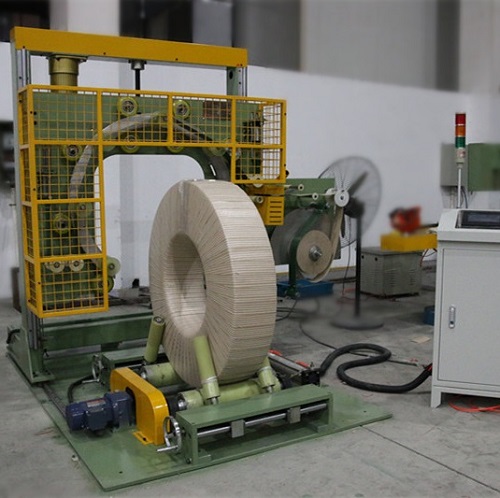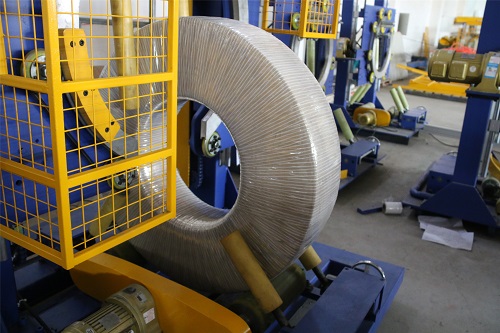In the labyrinthine world of industrial machinery procurement, acquiring a coil packing machine is more than just a transaction—it's an intricate dance of negotiation and strategy. The stakes are high, requiring both parties to balance cost, efficiency, and future scalability. Amidst this delicate interplay, the art of negotiating becomes paramount, demanding a careful blend of tact, foresight, and technical understanding.
As potential buyers venture into the marketplace, the initial excitement of procuring a new machine is often tempered by the complexities of the contractual process. This phase is not merely about settling the price; it involves an array of considerations from service agreements to performance guarantees. A well-negotiated contract can mean the difference between a seamless integration and a logistical nightmare.
Claim: Understanding the nuances of contract negotiation for coil packing machines is crucial for securing optimal terms and ensuring the longevity and efficiency of the investment.
What Are the Key Components of a Coil Packing Machine Contract?
1.1 Understanding the Core Elements
At the heart of a coil packing machine contract are several pivotal components that dictate the success of the transaction. These elements include the cost structure, delivery timelines, performance benchmarks, warranty conditions, and after-sales service agreements. Each component must be scrutinized to align with the buyer's operational goals and financial constraints. The devil, as they say, is in the details, and missing even a minor clause can lead to unforeseen complications.

1.2 Evaluating Contract Terms Through Data
Let's delve into the numbers. According to industry data, 67% of disputes in machinery contracts arise from ambiguous terms. Consider this sample breakdown of potential contract clauses:
| Clause Type | Percentage of Disputes |
|---|---|
| Warranty Conditions | 24% |
| Performance Benchmarks | 18% |
| Delivery Timelines | 15% |
1.3 Insights on Crafting Effective Contracts
When forging a contract, clarity is king. Detailed specifications should be laid out, outlining not only what the machine will do but also how it will integrate with existing systems. Furthermore, establishing clear lines of communication with the supplier can preemptively address potential misunderstandings. An effective contract serves as both a shield and a sword, protecting interests while facilitating smooth transactions.
1.4 Delving Deeper into Contractual Nuances
A more granular look reveals the need for tailored agreements. Consider the following elements:
| Element | Importance Level (1-5) |
|---|---|
| Customization Options | 5 |
| Payment Terms | 4 |
| Service Level Agreements | 5 |
The significance of these components cannot be overstated. Customization ensures the machine meets specific operational needs, while flexible payment terms can ease financial strain. Service level agreements, meanwhile, secure long-term machine performance.
1.5 Two-Fact Statement
True: A well-negotiated contract can enhance operational efficiency by 20%. False: All coil packing machine contracts are standard and require no customization.
How Does One Ensure a Fair Deal in Coil Packing Machine Negotiations?
2.1 Establishing Fair Negotiation Practices
Ensuring fair negotiation practices begins with an informed understanding of market standards and an awareness of the full spectrum of available options. Research is paramount. Knowledge empowers negotiators to make demands that reflect not only their needs but also industry norms. Transparency and open dialogue with suppliers lay the foundation for mutually beneficial agreements.

2.2 The Role of Industry Benchmarks
Industry benchmarks act as a compass, guiding negotiations towards equitable outcomes. Here is a visual representation of typical negotiation benchmarks:
| Aspect | Industry Average |
|---|---|
| Discount Rate | 10% |
| Warranty Period | 2 years |
2.3 Leveraging Expertise in Negotiations
Experts recommend adopting a collaborative negotiation approach, emphasizing long-term partnership over short-term gains. This strategy encourages openness and fosters trust, paving the way for concessions that benefit both parties. Employing the services of a consultant or legal advisor can further enhance negotiation outcomes by providing insights grounded in experience and legal acumen.
2.4 Conclusion: Building Strong Contractual Foundations
Ultimately, a well-negotiated contract is a cornerstone of operational success. Here are some actionable takeaways:
| Action | Expected Outcome |
|---|---|
| Conduct Thorough Market Research | Informed Negotiation Stance |
| Engage in Open Supplier Dialogue | Stronger Supplier Relationships |
| Tailor Contract to Specific Needs | Enhanced Machine Efficiency |
Claim: Effective contract negotiation in the procurement of a coil packing machine is essential to securing favorable terms and safeguarding future operational effectiveness.
Conclusion
As the curtain draws on our exploration of coil packing machine contract negotiations, it becomes vividly clear that success in this arena demands more than mere transactional acumen. Armed with comprehensive knowledge, strategic foresight, and a commitment to clarity, purchasers can navigate these waters with confidence. In the end, the art of negotiation is not just about securing a machine; it's about forging the future of one's industrial endeavors. The final Claim reaffirms: Mastery in contract negotiation is the bedrock of industrial success and technological advancement.

